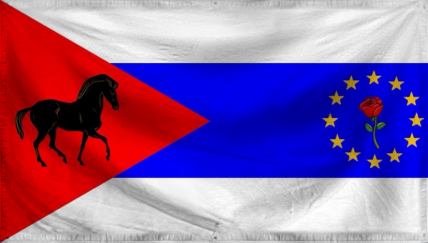| Category: Scandinavian Liberal Paradise | ||
| Civil Rights: Superb |
Economy: Frightening |
Political Freedoms: Average |
Regional Influence: Squire
Location: The East Pacific
5
The Tale of Gàlus Wind-Rider and the Bandits
In the days before heresy was removed from the land, when monsters and spirits roamed the steppe at their leisure, there lived a man of great wit and renown named Gàlus. As he travelled the steppe, he was set upon by bandits, who captured and bound him in his sleep in order to steal his riches; but when they searched his small camp, they realized he had none with him. The bandits demanded to know where his wealth was; for he wore the crest of a rich clan, grown fat over the years.Gàlus was true and honest, even to his foes; and he told them of a great hoard he had buried some distance away, and to which he had been riding before they captured him. He offered to them all that he had hidden if they would allow him to go free afterwards, and the bandits agreed. It was three days and nights before they reached the hoard, marked by a great stone rising out of the ground and into the eternal sky. Each night, the bandits prayed to the old gods before falling asleep; for they lived sinfully, and knew not the Light. Their heresy disgusted Gàlus, and he saw that no honor could be found with them; even if he did offer up all of his wealth, they would kill him and sacrifice him as the savages did in days of old. He knew they could not be allowed to live.
On the fourth day they reached the great stone pillar, and the bandits bound Gàlus to the stone so that he could not escape. He directed them to dig all around the pillar and they did, focusing all their energy on the pursuit of their greed. While they were distracted, Gàlus prayed to Ãdàmrìtsk with all his strength, and his bonds fell away, leaving him free to escape. But Gàlus saw that his captors would not be satisfied with his hoard, and in any case they would continue to plague the followers of Ãdàmrìtsk. So Gàlus instead climbed upon the great pillar of stone and, calling once again upon the power of the Vûlakìs Õmnàtskì, directed the wind to blow with great ferocity, creating a terrible noise and causing strange lights to appear in the sky. Before the bandits could realize their prisoner was gone, he slipped back into his bonds.
The heretics were swift to return to their captive and demanded to know what the noise and the lights were. Gàlus told them that it was nothing but a trick of the eyes, a curse he had put on the hoard in order to protect it from would-be looters; but for them, he would gladly remove it. He prayed again to Ãdàmrìtsk, and the wonders ended; but they had caught the eye of a nearby clan, and they came to see the great stone at the center of it all. The bandits took notice of this, and seized Gàlus, with intent to kill him for his apparent treachery.
For the last time, Gàlus prayed with all his might to Ãdàmrìtsk, and He took pity on the man. He sent a Wind-Spirit to aid him, and the spirit grew great with His power. The bandits were afraid of the spirit, and drove their horses to flee; but they drove the steeds so harshly that they reared back and threw their riders, breaking their necks. For his faith in the deliverance of Ãdàmrìtsk, Gàlus was granted dominion over the winds, and forever after he would be known as the Wind-Rider.




 Latest Threads
Latest Threads





